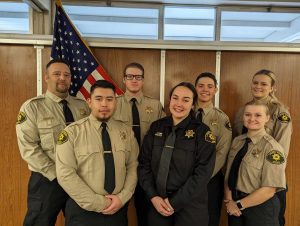 Lassen College AOJ
Lassen College AOJ
Too many badges. Not enough bodies to bear them.
For rural communities in California’s Far North region, demand for qualified peace officers is exploding, creating high-level opportunities for students in law enforcement pipelines. With a versatile slate of programs focusing on fast, field-ready job skills, Lassen Community College is committed to providing heroes for hire.
“It’s not just policing. We’re seeing a shortage in corrections, and with parole and probation officers, too,” says Terra Avilla, a former police officer and current instructor in Lassen’s Administration of Justice program. “There are more people leaving the force than entering,”
The term “peace officer” encompasses the three domains within the criminal justice system: law enforcement, the courts and corrections. Beginning in 2020, this sector faced a massive exodus, owing to the stress dealt by the twin blows of the COVID-19 pandemic and negative press following some well-publicized incidents of police overreach.
The aftermath has left a critical hiring gap for departments in California and beyond. According to the U.S. Bureau of Labor Statistics Occupational Outlook, job opportunities for police officers, probation officers and correctional personnel are expected to grow about three percent in the next decade.
Understaffing in these justice-related fields can be described as historic, with retirements and resignations persisting at unprecedented levels. The pandemic was particularly stressful for police officers, who saw their ranks decrease, making things even more stressful for those who remained. And while the problem is nationwide, it’s even more acute in rural areas, according to Avilla.
“Police and sheriff agencies all over Northern California complain about not being able to fill positions,” says the instructor.
Lassen’s Administration of Justice program has been addressing this shortage by preparing students for entry-level positions in myriad fields falling under the broad category of Peace Officer. Aside from police officers, the title includes juvenile services and court personnel, parole agents and corrections officers.
Lassen’s curriculum covers the prevention, discovery, control and treatment of crime, evidence collection, criminal law, community relations and more. Students gain insight into the structure of the criminal justice and court systems, as well as community services. An advisory committee, consisting of law enforcement and correctional service personnel, weigh in on course offerings and workforce educational needs and opportunities.
Students can opt for the associate degree, which promises a smooth transfer to a four-year university, or go directly into a training program in their chosen field. Lassen Community College is also host to correctional, juvenile justice and probation officer academies, allowing students interested in those areas to slide seamlessly into the program they need.
“Our program hits on the totality of things that fall under criminal justice,” says Avilla.
While certain, hands-on courses (forensics, for example) must be attended in-person, the majority can be taken online or in a hybrid format. This is a game-changer, as the college’s rural location means that students are often not from the area.
That’s increasingly important, as agencies from all over Northern California are sending candidates to Lassen Community College for training and upskilling. The exchange is a “win-win scenario” that serves students by offering advancement opportunities and a chance to boost their salaries, while supporting courts, prisons, and police academies that are finding it difficult to fill their ranks.
Like many California community college-based initiatives aimed at tackling the statewide skills gap, the program receives essential support from Strong Workforce Program (SWP) funding.
“We’ve used this funding to start up our dual pathway program for high school students, letting them know what we have to offer,” notes Michell Williams, Dean of Instruction at Lassen College. “We also use it to help with recruiting.”
Advertising isn’t cheap, after all. Also not cheap: the in-service classes that require students to undergo a good deal of training within dedicated facilities. “Strong Workforce funds are used here largely for equipment, such as materials for our firearms and perishable skills classes,” explains Tom Downing, director of the AJ program. “They also cover the supplies we need for forensics classes, crime scene mock materials, holsters and belts, and even traffic cones.”
The Beat Goes On
All of this is important, as the California legislature debates Bill 89, designed to implement the reforms needed to minimize the use of deadly force in policing. The new law would raise the minimum age for the employment of police officers to 21 and require candidates to pass a “modern policing degree” program that includes courses in psychology, ethnic studies and law – all before they enter the police academy.
The idea is for new candidates to develop emotional intelligence and critical thinking skills along with soft skills such as cultural competence. Training includes interpersonal communication, de-escalation techniques and the importance of community engagement.
As Downing explains, empirical data showing that educated police officers are less likely to be involved in incidents of force.
According to the California Assembly Bill 89 Modern Policing Task Force Report, presented by the California Community Colleges Chancellor’s Office, “better-educated officers perform better in the academy, receive higher supervisor evaluations, have fewer accidents and disciplinary actions, are less likely to be assaulted, and miss fewer days of work than their counterparts.”
“California is leading the nation in making this field more of a profession,” says Downing. “Lassen is working hard to position ourselves for this new degree once we know exactly what will be required.” He expects that the bill to be ratified by 2025.
While Bill 89 will specifically address changes within the ranks of police officers, Downing expects the benefits to filter across to the broader range of criminal justice positions. “I think the changes being made will change the culture.”
Above all, he concludes, “we want to be a force that the public supports.”
December 2023